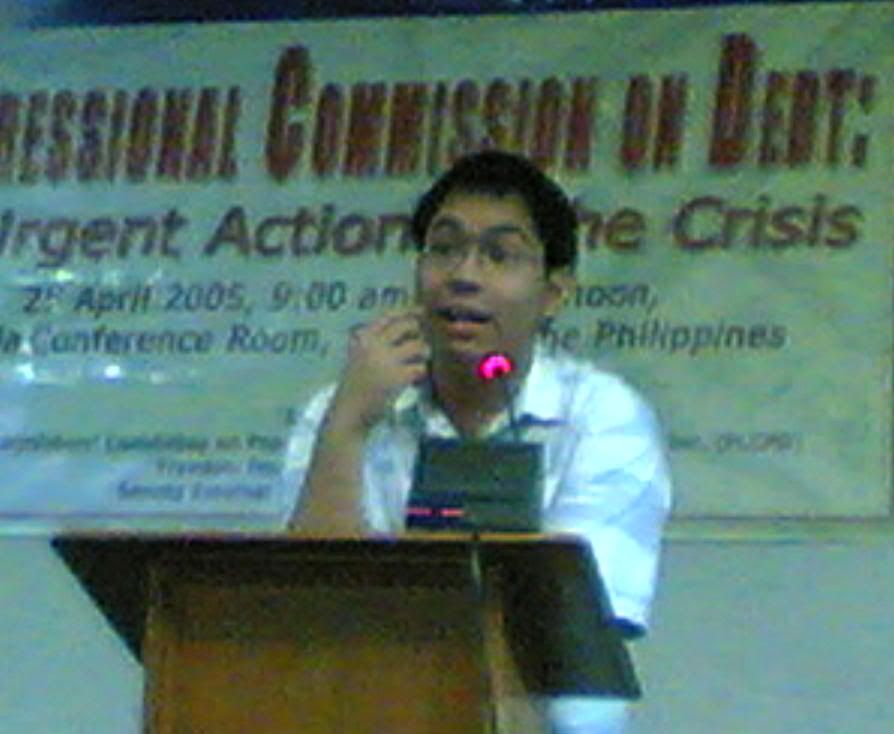We owe them [I owe you]
Latest government figures have quoted the Philippines' public sector debt to be at an estimated PHP5.9 trillion (105T US$, at an exchange rate of PHP56=$1). Of this figure, PHP3.4 trillion worth is courtesy of the national government, causing 31.4% of the national budget to be eaten up by debt servicing to pay for the principal loans and interest accrued.
Notwithstanding my attempt to sound technocratic with the monetary figures and all, the theme of this post is simple: the Filipino people owe creditors a lot of money.

Myself reacting to the reports presented at the Senate last April 25.
I got the data from a forum I attended last April 25 at the Philippine Senate. Entitled "Congressional Commission on Debt: An Urgent Action to the Crisis," the forum was co-sponsored by entities like the Freedom from Debt Coalition (FDC) and the Philippine Legislator's Committee on Population and Development Foundation, Inc. (PLCPD).
Opening remarks were delivered by Sen. Rodolfo G. Biazon, who drafted Senate Joint Resolution No. 1 that provides for the creation of a congressional commission to review and assess the debt policies, strategies, and programs of the Philippines. Recently Sen. Francis N. Pangilinan co-sponsored the measure, which is backed by equivalent legislation at the House of Representatives: House Joint Resolution No. 2 by Rep. Edcel C. Lagman.
Forum speakers included Bangko Sentral ng Pilipinas (BSP) Asst. Gov. Diwa Gunigundo who reported on the current status of the Philippine Debt Stock (with focus on external debt), Department of Finance (DOF) Asst. Sec. Gil Beltran who talked on the government's efforts in dealing with the debt problem, and FDC SecGen Lidy Nacpil who clamored for action on the Joint Resolution calling for a Congressional Commission on Debt that shall do a Debt Audit.
The two agents of the Executive Branch - Gunigundo and Beltran, had a common theme - that faulty tax efforts are to blame for the ballooning of public debt. Beltran elaborated that the higher level of deficit is largely due to the decline in the revenue effort. He ascribed these to two things: 1) failure of the tax structure and inflexible/unresponsive tax policies, and 2) weak tax administration.
It was acknowledged that tax enforcement problems and an inconsistent, "roller-coaster ride" in collection performance are reasons for the weak tax administration. On the other hand, excise taxes not indexed to inflation, low VAT effort, liberal fiscal incentives, and lowered tarrif rates are to blame for the failure of the tax structure. I'm not so sure who said this (was it Gunigundo?): if the tarrif rates of the early nineties were not aggressively reduced, we would be in a better fiscal position now.
Nacpil of the FDC acknowledged the technocrats' statements, but underscored that the falling tax effort is only part of the problem. She narrated that the problem is historical, since the 1970s when there was a surplus of funds from Northern countries that the Southern countries capitalized on through loans (Marcos era). Succeeding Presidents did not help - notably former President Corazon Aquino who acknowledged as part of the government's responsibilities what the FDC calls illegitimate debt. Such onerous debt reportedly includes dubious borrowings of Marcos cronies, and later on the funds used for Independent Power Producers (IPPs).
After all was said, reactors took the floor. I was the fourth or fifth, and I reacted on behalf of the youth sector in general and UP Manila students in particular. I supported the FDC's call for the passage of SJR No. 1 that would effectively complete the circuit towards the establishment of the Congressional Commission for Debt Audit, that shall take upon itself to distinguish legitimate from illegitimate debt. Perhaps it is through this concrete step, via the framework of our democratic institutions, that we shall move towards the right direction in addressing problems like the recent (still apparent?) fiscal crisis.
Note: To date, the House of Representatives has already approved on Third Reading Rep. Lagman's HJR 2 (Yeas: 129, Nays: 0, Abstains: 0, 9/21/2004). The Senate has yet to act on Biazon and Pangilinan's SJR 1.



1 Comments:
hehe, i took that picture right? bat yan pinili mong i-ipload. mukha kang kawawa sa pic mo:D
Post a Comment
<< Home